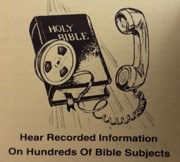Ministers Blogs
“Should we "demolish"?”
Categories: Christian PrinciplesEveryone knows the story of the woman caught in adultery (John 8:2-11). Even people who don’t know much Bible know this story, and in fact it is often used against people who do know a lot of Bible. It’s very easy to cast any religious folks who try to take a moral stand as the hypocrites with the rocks.
People use the phrase “cast the first stone” to say, “If you have ever sinned, you have no right to judge my sin.” But that is not the moral of this story at all.
Jesus is not saying we can never confront someone else’s sin, and he is not throwing out traditional values. He is not doing what so many people try to do with this story because so often they ignore the last line:
John 8:10-11 (NIV) Jesus straightened up and asked her, “Woman, where are they? Has no one condemned you?”
No one, sir,” she said.
Then neither do I condemn you,” Jesus declared. “Go now and leave your life of sin.”
He doesn’t say, “Well, you know, the Old Testament stuff is really harsh and contradictory, and those narrow restrictions on our sexuality are entirely unrealistic.”
Jesus never ignored or minimized anything God said about right and wrong. He doesn’t flinch one bit when telling her the way she was living was immoral.
But he doesn’t just leave her there in her sin with no hope. That’s what the Pharisees did: they all walk away and leave her like a scrap of litter on the side of the road.
We don’t want to be like them. So I just want to pull out two simple applications for us. Here’s the first: Scriptures are not to be thrown like rocks at people we don’t like.
Nobody is going to care if a scripture is true if you are hurling it at them like a rock. I hate the videos on Facebook that promise to show an atheist or a liberal get “demolished” by someone quoting scripture. I don’t want to demolish anyone. I want to be able to share God’s word in a way that makes people at least willing to listen, to engage in a conversation.
There is a right way to tell someone they are wrong. In John 8 Jesus told both the Pharisees and the woman caught in adultery that they were wrong, and he used scripture, but he didn’t destroy anyone. He did it quietly and decently, and in a way that called everyone to be better.
And that leads to our second application: Our concern over sin should be about how that sin is damaging a real person.
What these Pharisees did to her had nothing to do with defending marriage or really even upholding scripture. This woman was not a real person to the Pharisees. The Pharisees presented this woman to Jesus like a trick question on a quiz so they could “demolish” him. She was just something to talk about.
That feels like what we do so often now. Church, I just want to remind you when you get on social media, or when you start talking about a certain person or group that you don’t like, to check your motives. The politicians on both sides of the aisle are all real people. Liberal or conservative, black or white, pagan or homosexual or protestor, they are all sons and daughters, parents and spouses to someone. We need to remember that when we talk about them. We need to ask if we’d act differently if we really did care about saving them instead of demolishing them.
-Scott Franks





